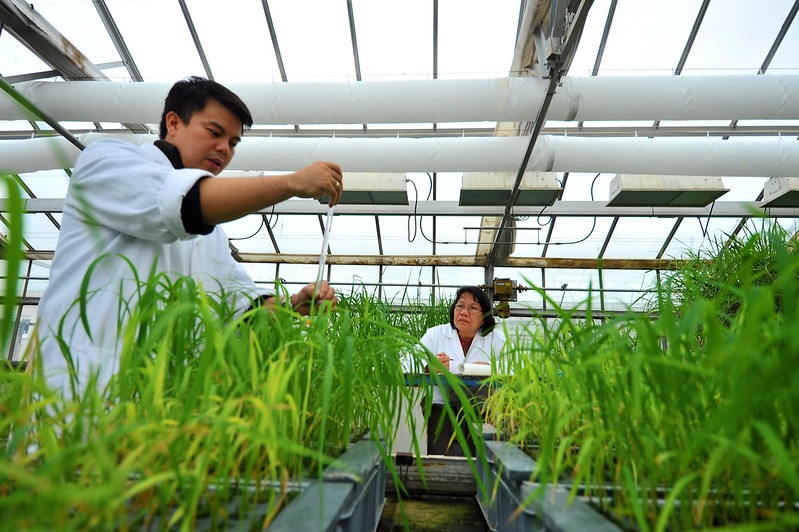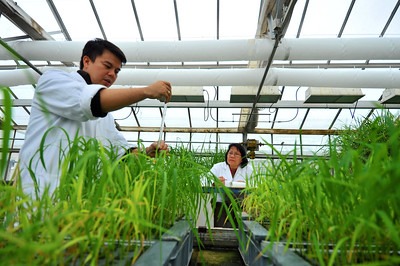
GM/Biotech Crops Report – August 2020
7th August 2020- GM/Biotech Crops Monthly Reports (BELOW) form part of BCPC’s free three-tier Biotech Crops Info service.
- This service also includes a weekly round-up of news from around the globe – see BCPC Newslink GM Crops section.
- Plus – Free access database on over 300 GM/biotech products covering 23 crops in the global market visit BCPC’s GM/Biotech Crops Manual – Register here for free access.
- Already registered? Click here
GM/Biotech Crops Monthly Report August 2020
Gene editing to be considered for UK crops
 The British Society of Plant Breeders (BSPB) is urging support for an amendment to the Agriculture bill that would allow breeders access to the latest gene-editing techniques. Full story
The British Society of Plant Breeders (BSPB) is urging support for an amendment to the Agriculture bill that would allow breeders access to the latest gene-editing techniques. Full story
Pic: IAEA
Rice that calms
The Chinese Academy of Science has modified rice to produce naturally-occurring compounds that are known to reduce blood pressure with fewer side effects than the commonly-used drugs. The delivery method for this treatment is to eat the rice. Full Story.
More wood from trees
Scientists at Umea University in Sweden have developed a hybrid aspen tree by crossing European and American aspen to produce a variety that is more resistant to insect damage, fungal attack, frost and other stress factors. After planting 636 trees out in 2014 the results are encouraging and bigger tests are planned. The trees will be used for fuel and biofuel production. Full Story
Gene for phosphorus uptake
The world is short of phosphorus supplies so we need to used what we have more efficiently. Now scientists at Copenhagen University have identified the plant gene that regulates cooperation between plant roots and soil mycorrhiza which is essential for optimum phosphorus uptake. Full Story
More aromatic rice
Researchers in China have used CRISPR-Cas9 to edit some genes associated with cytochrome P450 in rice. This has increased grain size and increased the production of aromatic compounds without affecting agronomic traits. Full Story
 Covid-19 and Neanderthals
Covid-19 and Neanderthals
The Max Plank institute has found a link between people that experience more severe symptoms of Covid-19 infection and genes that they have inherited from early Neanderthals. Full Story
Arabidopsis modified to store water
A team led by Nevada University has modified Arabidopsis to have larger cells and fewer stomata. The larger cells hold more water and the reduction in stomata number reduces water loss, making the plant more resilient in drought and it can tolerate greater soil salinity. However, water loss from stomata is essential to draw nutrients up to the leaves from the roots so I wonder how well these plants will perform in practice. Full Story
Cyanide-free cassava
Cassava is a vital source of calories for over 1 billion people around the world but it contains traces of cyanide. Science has shown that the production of cyanide can be reduced by RNA interference (RNAi) but now a team at Danforth Plant Science Centre have used CRIPR editing of the genome to block the production pathway. Does this make the crop more susceptible to pests and diseases. Full Story
 Covid-19 came from bats
Covid-19 came from bats
An international team comprising researchers from China, Europe and the USA claim to have discovered that the virus that causes Covid-19 has been circulating in bats for decades and, more worryingly, that there are a number of other viruses in bats that have not yet crossed the species barrier. Full Story
No more PGRs?
Working on rice, the genes that accelerate and decelerate internode length have been identified and can be used to control plant height. These genes are not just found in rice bur are also known to be present in barley, sugar cane and in some grasses. Does this mean that we can engineer plants that don’t need to be controlled with growth regulator sprays and is this the end of lodging. Full Story
THE LATEST ADDITIONS TO THE GM/BIOTECH DATABASE ARE:
• DAS40278 – maize with tolerance of 2,4-D herbicide approved for food and feed use in Russia
• MZHG0JG – maize with tolerance of glufosinate and glyphosate herbicides approved for food and feed use in Russia
• TC1507 – maize with tolerance of glufosinate herbicide and resistance to Lepidopteran insects approved for food and feed use in Russia
FOR INSTANT ACCESS TO GM BIOTECH MANUAL CLICK HERE (Registration required)
Already Registered? Click here to access

